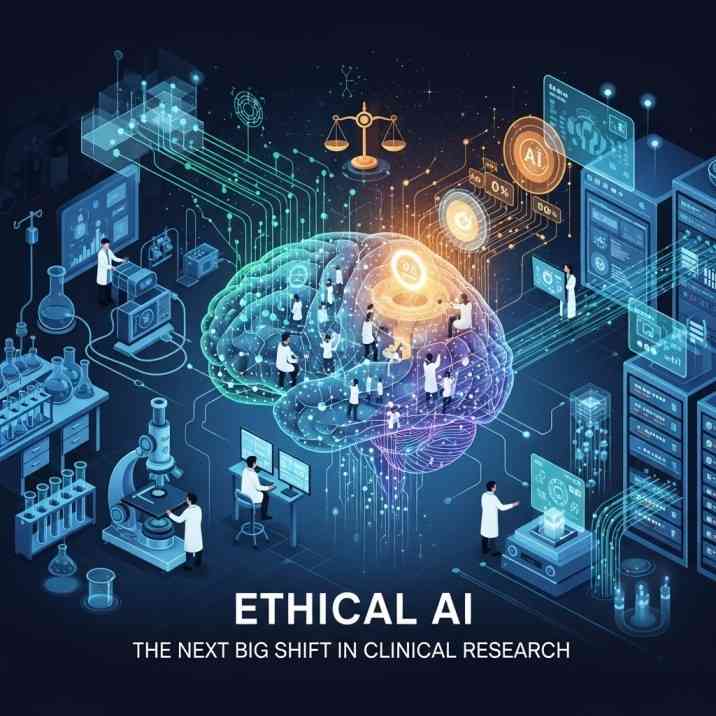


Discover how ethical AI is transforming clinical research by ensuring transparency, fairness and trust in data driven medical innovations.
Abstract
Artificial Intelligence (AI) has rapidly become an essential tool in clinical research accelerating drug discovery, trial design and data analysis. However, its speed and complexity introduce profound ethical questions regarding patient safety, data fairness and human oversight this article explores why the discussion around ethical AI is no longer a footnote but the next mandatory field of study in medicine we examine the critical challenges of algorithmic bias and the black box problem emphasizing the immediate need for transparency and robust human accountability to ensure AI drives equitable and trustworthy medical advancements for everyone.
Introduction: The Unstoppable Rise of AI in Medicine
If you follow medicine or technology at all, you know AI is changing everything it is revolutionizing clinical research by shortening the time it takes to find new drug candidates and identifying patients for clinical trials in mere seconds this technological leap promises faster cures and better health outcomes for the global population but as AI systems get smarter and more integrated into patient care and drug development a new, critical topic has jumped to the forefront of every lab and boardroom ethics it is no longer enough for an algorithm to be fast it must also be fair understanding this balance is vital for anyone entering the field which is why securing the foundational knowledge from a specialized Clariwell clinical research course is the most effective way to start we need people who understand both the science of clinical trials and the ethical guardrails required to use AI responsibly.
The Problem of Bias: When Algorithms Are Unfair
One of the biggest concerns about AI is its potential to bake existing societal biases right into new medical treatments AI is only as good as the data it is trained on if we feed it historical clinical data that overwhelmingly features patients from one ethnic group, one gender or one socioeconomic background the AI will learn to make predictions best suited for only that group.
For instance, an AI tool designed to flag patients at high risk for a certain heart condition might perform brilliantly on European based populations but fail drastically when applied to South Asian or African populations because the training data lacked diversity.
This is not about the AI being intentionally racist or sexist it is about it being a passive mirror of incomplete historical datasets if we let this happen we risk creating medical breakthroughs that disproportionately benefit some while actively harming or ignoring others ethical AI ensures that researchers actively audit their data inputs to guarantee diversity leading to models that offer accurate and equitable care for all patients regardless of their background.
The Transparency Challenge Decoding the Black Box
Another major ethical hurdle in clinical research is what experts call the black box problem.
Imagine an AI system analyzes a patient medical chart and concludes that they are an excellent fit for a high risk experimental cancer trial but when the doctor asks the AI why did you select this person over the others the AI can only respond Because my complex neural network said so that is why this lack of explainability, where the AI gives an answer but not the reasoning is a massive problem in medicine in clinical research, decisions about patient eligibility, dosage recommendations and predicting serious side effects cannot be based on a mystery human clinicians need to understand the logic to maintain accountability, trust and patient safety.
This need for explainability is why institutions are dedicating significant resources to specialized education the rigorous programs at the Clariwell clinical research institute now focus heavily on data governance and model interpretability preparing students to be the ethical watchdogs who can peer inside the black box and justify AI decisions to both regulatory bodies and patients.
Ensuring Safety and Accountability
When a human doctor makes a mistake, the chain of accountability is clear but who is responsible when an AI driven system selects the wrong dose for a trial participant leading to an adverse event Is it the physician who followed the AI recommendation, the data scientist who built the algorithm or the hospital that supplied the flawed training data.
Ethical AI demands we draw clear lines of accountability before a problem occurs this requires a strong framework where human oversight is mandatory at every critical decision point AI should function as a sophisticated consultant offering suggestions and predictions but never holding the final authority over patient life and safety.
Furthermore, we must ensure AI systems are constantly monitored because patients and diseases evolve an AI model that was safe and accurate today could become inaccurate and dangerous six months from now regular independent auditing is a core tenet of ethical AI deployment in the highly regulated field of clinical research.
Conclusion: The Future is Ethical
The integration of AI into clinical research is inevitable and enormously beneficial it holds the power to streamline processes, cut costs and accelerate the discovery of life saving medicines like never before. However, unlocking this potential relies entirely on our ability to govern the technology with the highest ethical standards we must commit to rooting out bias from our data, demanding transparency from our algorithms and maintaining robust human accountability ethical AI is not just a regulatory hurdle it is a moral imperative that ensures the technology serves the ultimate goal of medicine providing equitable and safe care to every human being for professionals aiming to navigate this complex, rewarding and rapidly evolving environment rigorous specialized Clariwell clinical research training is essential to ensure they are prepared to be the ethical leaders who will responsibly shape the next chapter of medical discovery.
